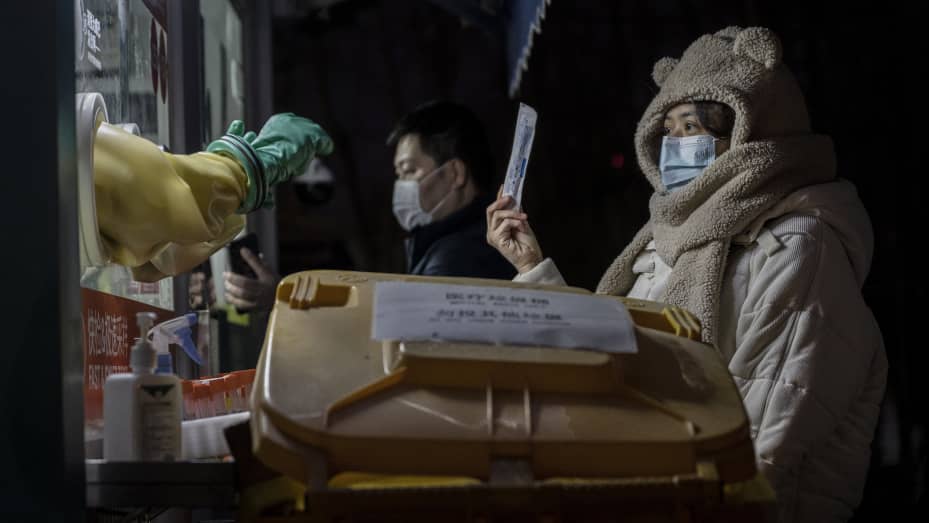Morgan Stanley Says China's First Quarter Growth Could Fall As Low As 3.5% Due To Coronavirus
Morgan Stanley says China's first quarter growth could fall as low as 3.5% due to Coronavirus. Morgan Stanley, a multinational investment bank and financial services company, predicted in 2020 that China's first-quarter growth could fall as low as 3.5% due to the coronavirus outbreak.
Author:Andrew StevensonReviewer:Johnathan MillerFeb 13, 202398.6K Shares1.5M Views

Morgan Stanley says China's first quarter growth could fall as low as 3.5% due to Coronavirus. Morgan Stanley, a multinational investment bank and financial services company, predicted in 2020 that China's first-quarter growth could fall as low as 3.5% due to the coronavirus outbreak.
The prediction sparked discussions and concerns about the economic impact of the pandemic on the world's second-largest economy.
The coronavirus outbreak, which started in the city of Wuhan, China in December 2019, has since spread to become a global pandemic.
The virus forced countries to implement measures such as travel restrictions and lockdowns to slow its spread, leading to significant disruptions to businesses and economies worldwide.
China was one of the first countries to be hit by the virus and had since taken several measures to contain its spread and revive its economy.
Despite these efforts, the country's economy had been severely impacted and the first quarter growth was expected to be significantly lower than the same period in the previous year as Morgan Stanley says China's first quarter growth could fall as low as 3.5% due to Coronavirus.
How Did The Coronavirus Affect China's Economy In The First Quarter Of 2020?
Morgan Stanley's prediction was based on the bank's analysis of various factors such as the duration of the outbreak, the effectiveness of containment measures, and the impact on consumer spending and investment.
The bank believed that the first quarter growth could fall as low as 3.5% if the outbreak lasted for a longer period and containment measures remained in place for a significant time.
The impact of the coronavirus on China's economy had raised concerns about the country's ability to reach its target of doubling its gross domestic product (GDP) by 2020, compared to 2010.
The country had been a major driver of global growth in recent years and a slowdown in its economy could have far-reaching implications for the global economy.
Morgan Stanley's prediction also sparked discussions about the role of the government in reviving the economy.
The Chinese government had already implemented measures such as monetary stimulus, tax cuts, and infrastructure spending to boost growth.
The government had also been encouraging businesses to resume operations and has provided support to small and medium-sized enterprises.
Despite these efforts, it might take time for the country's economy to fully recover. The duration of the outbreak, the effectiveness of containment measures, and the impact on consumer spending and investment would play a significant role in determining the pace of recovery.
What Is The Current Status Of China's Economy Due To The Coronavirus Pandemic?
The coronavirus pandemic had a significant impact on the global economy, including that of China. As the world's second-largest economy, China's economic performance played a major role in the stability of the global financial market.
The outbreak of the virus in Wuhan, China in late 2019 had a significant impact on the country's economy, particularly in the first quarter of 2020.
In early 2020, China's economy experienced a sharp slowdown as a result of the coronavirus pandemic, which forced many businesses to shut down and millions of people to stay at home.
As a result, the country's Gross Domestic Product (GDP) growth rate fell to 6.8% in the first quarter of 2020, the lowest in decades. This was in stark contrast to the previous quarter's 6.0% growth rate.
However, China was one of the first countries to bring the virus under control and by the end of 2020, it was able to recover quickly and get back on track.
This was largely due to the country's effective response to the pandemic, which included measures such as lockdowns, travel restrictions, and massive stimulus measures to support businesses and households.
The country's economic recovery was also aided by the return of global demand for its goods and services, which helped to boost its exports.
In addition, the Chinese government also implemented a range of economic policies aimed at boosting domestic consumption, such as tax cuts and increased infrastructure spending.
As a result, China's economy showed a remarkable recovery in the second half of 2020 and into 2021, with its GDP growth rate recovering to 2.3% in the fourth quarter of 2020. The country's GDP growth rate has continued to improve in 2021, and it is expected to reach around 8% for the year.
The coronavirus pandemic has had a significant impact on China's economy, but the country has been able to recover quickly due to effective pandemic response measures and a range of economic policies aimed at boosting domestic consumption and exports.
The current status of China's economy is positive and its growth rate is expected to remain strong in the coming years.

How Can the Coronavirus Impact China’s Economy?
People Also Ask
What Was Morgan Stanley's Prediction For China's Q1 Growth Due To The Coronavirus?
Morgan Stanley predicted that China's first-quarter growth could fall as low as 3.5% due to the impact of the coronavirus.
Why Was China's Growth Expected To Be Impacted By The Coronavirus?
China's growth was expected to be impacted by the coronavirus due to the measures taken to contain its spread, such as lockdowns and travel restrictions, which disrupted the country's economic activities.
How Had The Coronavirus Affected Other Countries' Economies?
The coronavirus had a significant impact on the global economy, causing widespread disruptions and leading to an economic contraction in many countries.
What Other Factors Could Impact China's Growth In Q1?
Other factors that impacted China's growth in Q1 include trade tensions with the US, a slowdown in investment and consumption, and supply chain disruptions.
What Steps Is The Chinese Government Taking To Address The Economic Impact Of The Coronavirus?
The Chinese government took a number of steps to address the economic impact of the coronavirus, including implementing monetary and fiscal policies to support businesses and households and ramping up efforts to stimulate domestic consumption and investment.
Conclusion
Morgan Stanley says China's first quarter growth could fall as low as 3.5% due to Coronavirus. Morgan Stanley's prediction of China's first-quarter growth falling as low as 3.5% due to the coronavirus outbreak raised concerns about the impact of the pandemic on the world's second-largest economy.
The Chinese government had taken several measures to contain the spread of the virus and revive the economy, but it may take time for the country to fully recover. The outcome would have far-reaching implications for the global economy and would continue to be closely watched by investors and policymakers.

Andrew Stevenson
Author
Meet Andrew Stevenson, a distinguished male writer whose passion and expertise encompass a wide array of topics, including global news, finance, health, celebrity culture, movies, and cryptocurrency. With a wealth of experience and a keen eye for detail, Andrew delivers engaging and informative content that resonates with readers from all walks of life. His insightful analysis of market trends, health breakthroughs, and the latest developments in entertainment captivates audiences, while his exploration of the burgeoning world of cryptocurrency offers invaluable insights into this rapidly evolving field. Andrew's commitment to excellence and his ability to distill complex information into accessible narratives make him a trusted source of knowledge and inspiration in today's dynamic media landscape. Join him on a journey of discovery as he illuminates the intersections of culture, finance, and technology, shaping the conversation one article at a time.

Johnathan Miller
Reviewer
Meet Johnathan Miller, an esteemed writer and analyst renowned for his expertise in global news, finance, health, and cryptocurrency. With a distinguished background in finance and a meticulous approach to research, Johnathan offers incisive insights into market dynamics and economic trends. His articles are characterized by a profound understanding of health-related issues and a clear articulation of the complexities surrounding cryptocurrency. Through his professional lens and commitment to excellence, Johnathan navigates the intricate webs of our interconnected world, delivering compelling analysis and thought-provoking commentary. Join him on a journey of discovery and enlightenment as he continues to shape discourse in these vital spheres.
Latest Articles
Popular Articles
